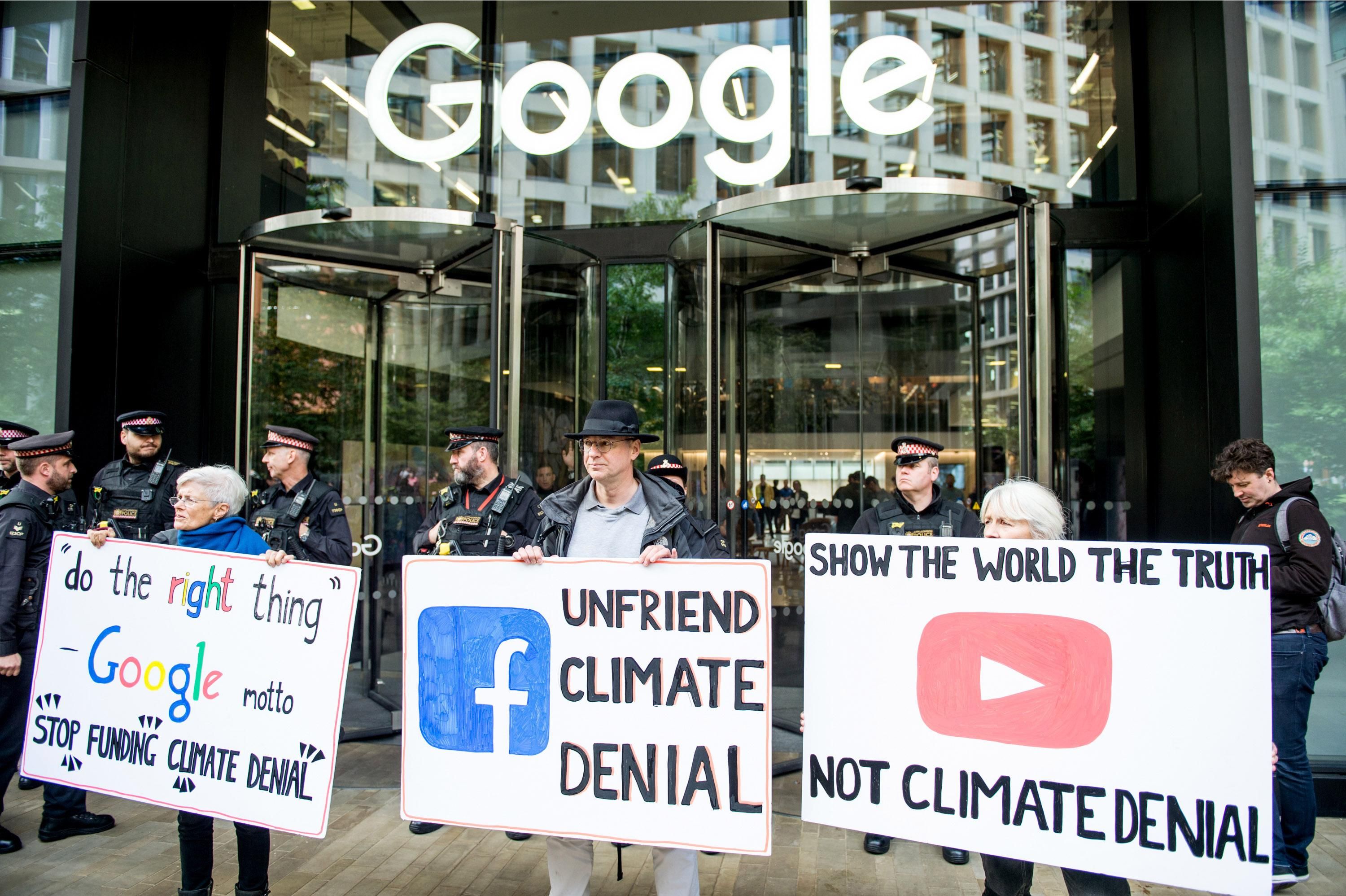
Just weeks away from the COP27 summit in Egypt, a report released Wednesday called out major online advertising networks for "actively funding and actively profiting from climate disinformation in the United States."
"Google must stop amplifying and enabling advertising on disinformation sites that pollute conversations on the climate crisis."
The analysis from the Climate Action Against Disinformation coalition, Friends of the Earth (FOE), and Dewey Square Group involved a review of 113 "climate disinformation sites," such as Fox News, Breitbart, Daily Wire, Gateway Pundit, The Epoch Times, Western Journal, TheBlaze, Daily Caller, RedState, and PJ Media.
Researchers found that of the websites reviewed from October 2021 to September 2022, nearly 80% "were displaying some kind of advertising from one or more of the major ad networks," including those owned by the tech giants Amazon and Google.
"Google's various display ad networks (DoubleClick, AdWords, and AdSense) were by far the most widely used on these websites, monetizing 49.6% of all sites and accounting for 97.7% of the projected weekly visits," according to the analysis.
Other key findings include:
- Of the 50 top sites in estimated weekly traffic, 39 of them (78%) were displaying ads from the Google Display network;
- 68 of the 113 sites (60%) of the websites contain code that would enable them to display Google ads (AdSense, AdWords, or Doubleclick); and
- 83 of the 113 sites (69.75%) show that they have Google as an authorized seller of ads in their ad.txt files.
"To give a sense of scale: If advertisers bought ads on these climate disinformation sites at an industry median price cost-per-click, then Google would potentially have pulled in $7.67 million in display advertising revenue over the past year from these sites," the report explains.
This despite a company policy announced last October for Google advertisers, publishers, and YouTube creators prohibiting "ads for, and monetization of, content that contradicts well-established scientific consensus around the existence and causes of climate change," including "content referring to climate change as a hoax or a scam, claims denying that long-term trends show the global climate is warming, and claims denying that greenhouse gas emissions or human activity contribute to climate change."
Given Google's outsized role in online advertising, Erika Seiber, a climate disinformation spokesperson for coalition member FOE, stressed the importance of action related to its ad practices.
"We can't solve the climate crisis if Google continues to enable and fund the sites that expose millions of people to climate denial," she asserted. "Google must stop amplifying and enabling advertising on disinformation sites that pollute conversations on the climate crisis."
"We have to stop this industry of opaque ad networks from propping up the dark corners of the internet," Seiber also said, calling the study "further proof that tech companies can't be trusted to self-regulate."
Along with Google and Amazon, the other top ad networks targeted in the report are MGID, Criteo, AdSupply, RTB House, Outbrain, Taboola, Yahoo, Infolinks, Adroll, AdMedia, and Skimlinks.
"Notably, Yahoo is responsible for almost 50% of total outgoing ad visits over the last 12 months, but this is almost entirely due to a single website, Fox News," the report states, adding that the site "appears to have heavily de-emphasized Yahoo advertising since sometime in July 2022."
The analysis highlights that besides Google, "advertising platforms' policies do not explicitly mention climate misinformation but do restrict the display of their advertising on sites that publish 'fake news' or other kinds of false or intentionally misleading content."
- Taboola: "Ads must not promote or disseminate anything that qualifies as fake news or any information that is at high risk of being false."
- Outbrain: "Content on websites must not include: [...] Fake News [...] Extreme political views."
- Criteo: Prohibits ads on any site that "shares mistruths and falsehoods" or "shares or propagates false information or fabricated information designed to deceptively imitate news media content."
The report suggests that "insofar as these platforms and advertisers purport to be good corporate citizens who are having a positive influence on the world, public pressure may lead them to reconsider their brand association with climate denialism, doomerism, and conspiracy theories."
The analysis—just the latest effort by campaigners pressuring Big Tech to use its power to limit climate disinformation—comes not only in the lead-up to COP27 but also during Advertising Week New York.
The group SumOfUs demonstrated outside the industry event in New York City on Tuesday to highlight how "advertisers are unknowingly funding websites spreading disinformation about elections, climate change, and the LGBTQ+ community."
SumOfUs also specifically took aim at Google, calling on the ad giant to fix its "toxic" model.
This content originally appeared on Common Dreams - Breaking News & Views for the Progressive Community and was authored by Jessica Corbett.